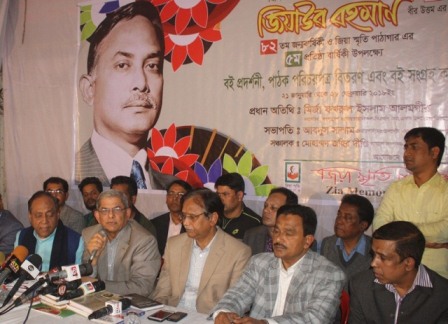BNP secretary general Mirza Fakhrul Islam Alamgir on Sunday questioned why Awami League fears a national election under a non-party administration since it believes its opponent will not get even eight percent of votes.
“Obaidul Quader has said whether we would get eight percent of votes. If you believe that, hold the polls under a neutral administration, and then see who get how many votes,” he said.
Speaking at a discussion, the BNP leader further said, “We know you won’t do that as you know it very well you won’t get even eight percent of votes if the next election is held under a non-party neutral government.”
Zia Smriti Pathagar arranged the programme at BNP’s Nayapaltan central office, marking the 82nd birth anniversary of party founder Ziaur Rahman.
Fakhrul said Awami league will not easily go to polls under a neutral administration only to avoid its sure defeat.
About the High Court stay order on the by-polls to Dhaka North City Corporation’s mayoral post, he said the government with the help of Law Ministry avoided the election using court in fear of losing it.
Accusing the government of continuously harassing and repressing BNP leaders and activists, Fakhrul urged his party colleagues to wake up and put up a strong resistance against the regime. “We must stand against this monstrous government and establish our rights and protect your children, wives and daughters.”
He also came down hard on Finance Minister AMA Muhith for calling BNP a ‘non-sense’ party saying, “What kind of sensible man you are since you say plundering of several thousand crores of taka from banks is a little matter.”
Fakhrul alleged that the government is using the law enforcers only to foil BNP’s political programmes and repress its leaders and activists.
“Even, police obstructed a blanket distribution programme of Dhaka South city unit saying there’s no permission to do that. We need permission for everything while another party can do anything without permission. We must end the politics of permission through a strong resistance,” he observed.




